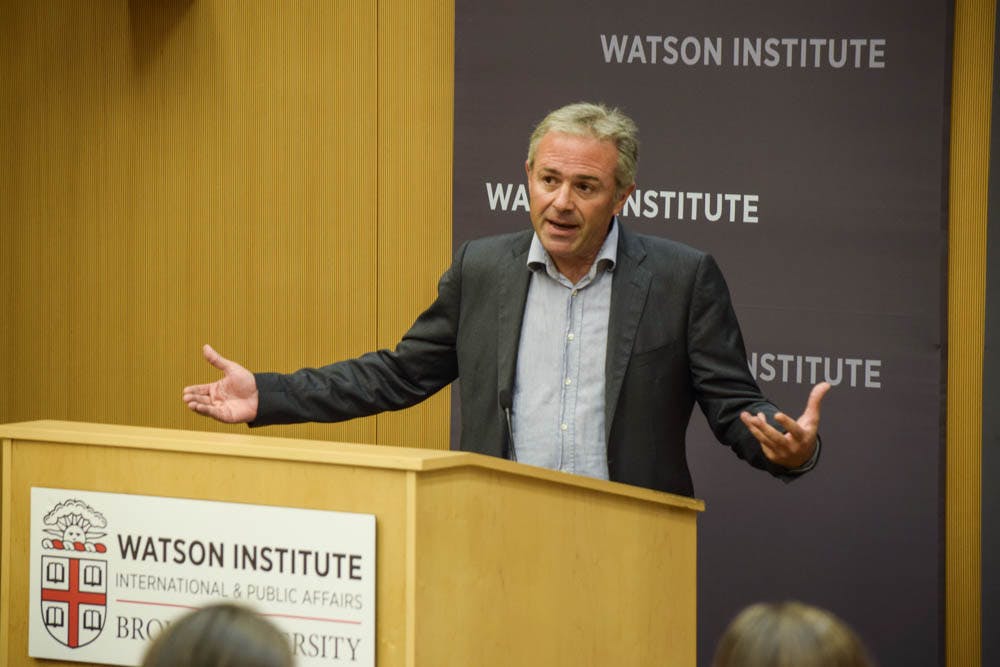“Some of you might remember the famous and much-deservedly celebrated New Yorker sketch writer, Andy Borowitz, writing an immortal headline on the 24th of June after the Brexit result had become known,” started Financial Times columnist Edward Luce. “He said ‘British lose (the) long cherished right to look down on Americans as dumber than they are.’ And then, as you know, in November, America leveled the playing field.”
Dry British humor and sharp political analysis defined Monday evening at the Watson Institute for International Public Affairs, when Luce joined Professor of Political Science and International and Public Affairs Mark Blyth to discuss his most recent book, “The Retreat of Western Liberalism.” Luce looked at Brexit and the election of President Trump against the backdrop of failing Western democracies. The talk explored history and governance across national lines as a means of understanding the present and of proposing a progressive reaction.
Luce pointed to the June 2017 election in France and Sunday’s election in Germany to both demonstrate the normalization of extremism transpiring globally and to provide glimpses of hope. Though French President Emmanuel Macron’s liberal party secured a comfortable majority in June, Marine Le Pen of France’s National Front party received 34 percent of the vote, Luce said. In contrast to the national identity crisis that befell France when Le Pen’s extremist father received 18 percent of the vote in 2002, Le Pen’s 2017 support stirred less of a reaction, Luce said.
“It’s the glass of champagne half full, but no time to be popping champagne,” Luce said of the French election.
German voters, who re-elected Angela Merkel to a fourth term as German chancellor Sunday, also voted the radical right-wing party Alternative for Germany into parliament. Though this is the first time in Germany’s post-war history that a far-right party has had representation in the “Bundestag,” a main house of parliament, fewer than one in seven of the electorate voted for the extremist party. Luce pointed to this number as notably low given a proportionately massive influx of refugees that had the potential to provoke stronger nationalist sentiments.
Britain and the United States could learn from Germany, Luce said. Germany is less prone to extremism, he argued, not only because it has grappled with its own history, but also because it has a middle class that has expressed less dissatisfaction than the middle class in the rest of Europe. The German vocational degree should serve as an example of successful skills training, Luce said.
“In Germany, they don’t make the mistake we make in the United States and Britain in particular, but in other countries too, of confusing having a college degree with being skilled. Or confusing not having a college degree with being unskilled.”
But even in this more resilient Germany, male middle-class wages have been stagnant since the late 1970s, a phenomenon prevalent across Western democracies, Luce said.
“I think there is no getting away from the economic pessimism of middle-class Americans and Europeans of all colors in explaining what we’re going through,” Luce said. “And I think not to do so, to simply attribute it all to deplorability, is not just a tactical mistake. It’s an analytic error as well.”
Cultural anxiety serves as another explanation for the swell of right-wing support, Luce said. He referenced the “good analytical questions” asked in Hillary Clinton’s recent book, “What Happened,” and pushed audience members to ask themselves how “Trump could have gotten in spitting distance of the presidency.”
With the reality of Trump as president, Blyth pushed Luce to consider if it would be possible for another nation to rise up and replace the United States as a global superpower, especially amidst the disarray plaguing the American democracy.
“I think no matter how bad we get, no one is going to replace the United States. But that’s slightly different to what your question is implying. I don’t fear China is going to supplant America as the hegemon, I fear chaos is,” Luce said.
Luce proposed civics education in K-12 schooling to educate voters on how to handle the massive influx of information, marketing and advertising that will only increase in future elections.
Students from the seminar POLS 1823Y: “Global Governance” asked the first round of questions, which were followed by questions from the general audience. Student inquiries included questions surrounding political strategy in harnessing Trumpian energy and the future of the environment and alternative energy.
“I thought the talk was very interesting,” said Llewellyn King, executive producer and host of “White House Chronicle” on PBS, who was in attendance. “And I thought the questions were extremely good. The class was extremely bright.”





